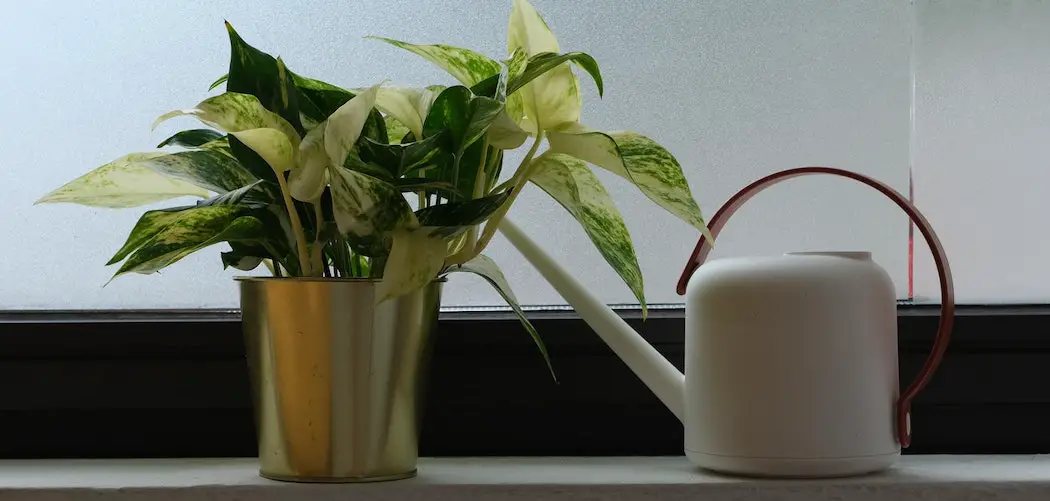Some kinds of houseplants require acidic conditions in order to thrive, and if you’re trying to get a particular houseplant to grow, the pH of the water may make a surprising difference.
Understanding acidic water can save you a lot of frustration and help your plants thrive.
So, in this article, I will tell you exactly what acidic water is, how to make it and if plants like it or not.
Here’s If Houseplants Like Acidic Water:
Not all houseplants need acidic water, but many houseplants prefer it and will thrive if they are given it on a regular basis. Any water that has a pH below 7.0 can be considered acidic, and while this can be bad for humans, it is often good for our plants.
1. What Is Acidic Water?
Any water that is below a pH of 7.0 will be considered technically acidic, although it may only be mildly so if it is around 6.5 or 6.0.
Acidic water is often created when carbon dioxide is dissolved in the water.
This creates carbonic acid and pulls down the pH value, making the water acidic.
Sometimes, water will be made more acidic by strong mineral acid or weak organic acid being dissolved throughout the liquid.
2. How Does Acidic Water Affect Houseplants?
Many plants thrive when they are given acidic water because it helps to break down organic minerals, making them more accessible to the plants and helping them to grow.
Acidic water can be good for houseplants, provided it is close to neutral, and not highly acidic.
It can encourage quick sprouting in vegetables, improve the strength of roots and tubers, and stimulate flower blossoming in some species.
3. Will Acidic Water Make Potted Soil Acidic?
Whether acidic water will have an impact on the potting soil depends on the texture of the soil.
Clay soils and loamy soils are more likely to alter their pH according to the acidity of the water that is added to them, whereas sandy soils tend to have a more stable pH value and do not readily change.
Any fine-textured soils, which is what you are likely using for your houseplants, should be resistant to a pH change as a result of being watered.
This is because sandy soil is more likely to contain positive ions, such as calcium, and these resist the change.
Therefore, you may find that acidic water does not noticeably change the pH of your potting soil in the short term. In the long term, it may make a detectable difference.
4. How Do You Make Tap Water Acidic For Houseplants?
You can make your tap water more acidic by adding a little vinegar to it. Vinegar has a low pH of around 2.3 (up to 3.4), so you will only need a small quantity in order to reduce the pH levels, unless your water is noticeably alkaline.
Making your tap water more acidic can be beneficial, but you should approach this with caution, because highly acidic water can be harmful to plants.
Most plants only enjoy water that is pH 6 or higher, and will not thrive when watered with anything under pH 6.
In order to follow along, you will need a pH meter and some household vinegar.
Here’s how you can make tap water acidic, step by step:
- Pour a gallon of water into a container and check the pH value is above neutral.
- Add half a tablespoon of vinegar, stir, and check the pH value again. If it is still too high, add another half tablespoon and stir again. You can add up to two tablespoons of vinegar using this method, and this should decrease the pH value and make the water more acidic.
- If you go too far and get the pH value below 6, add more water to dilute the vinegar. You can keep doing this until the water is at the right level.
- Use this to water your houseplants.
You can use any vinegar, but it is best to choose a household vinegar, which is unlikely to be too caustic.
Horticultural vinegar may be too strong and is usually used for herbicides.
5. Alkaline Vs Acidic Water For Houseplants
Although most plants will tolerate alkaline water, they prefer acidic water. Alkaline water can cause chalk buildup in the soil, but more importantly, it makes it harder for plants to absorb nutrients. This results in slower growth and more vulnerability to pests and diseases.
Of course, most tap water is not strongly alkaline, and some is almost neutral.
You should be able to use this for your plants without any issues.
Your plants will still grow fine, but they may not be as strong or grow as fast as if you give them acidic water.
If your tap water is too strong for houseplants, that’s a whole other issue. You check this in-depth article I have about how to make it safe.
6. Houseplants That Like Acidic Water
There are quite a few houseplants that prefer acidic water, and will grow much better if you add this to their containers – and they may even be harmed by alkaline water. These include:
- African Violets: these are simple plants to grow in many ways, but they must have acidic water to survive.
- Blueberries: although often grown in the garden, you can also grow a blueberry bush in your house if you have sufficient space, and it will prefer both acidic soil and acidic water.
- Ferns: another tricky plant to grow, most ferns (although not all) prefer to be given acidic water and acidic soil.
- Azaleas: these plants may survive with alkaline water and soil, but they will struggle, and may never flower, so it’s best to give them acidic soil and acidic water to drink.
- Abutilon: very pretty flowering plants, these grow best when given acidic conditions, ideally with a pH between 6.2 and 7, which means that acidic water is the most suitable option for them.
Many other houseplants that do not need acidic soil will also benefit from being given acidic water because of the effect it has on the available nutrients.
If you want to help boost your plants, adding a little bit of vinegar to their drinking water could be helpful.
7. Houseplants That Hate Acidic Water
Most houseplants do not dislike acidic water, but if you have any of the following alkaline-lovers, you may wish to leave the vinegar out of their water in case it harms them:
- Maidenhair ferns
- Hyacinths
- Oxalis
- Canna lilies
- Asparagus ferns
You should note that none of these will tolerate highly alkaline conditions, but they prefer somewhat alkaline soil, and will be happy with normal tap water (which tends to be alkaline), rather than tap water and vinegar.
Don’t ever try and put one of these plants in a very alkaline environment, because it will die.
8. Can Acidic Water Harm Your Houseplants?
Yes, overly acidic water is harmful to houseplants. Before watering any plants, check the pH value of the water. Most plants prefer it to be between 6 and 7, and will not tolerate it if it drops much below 6.
They may start to suffer from root burn and other problems, and the more acidic the water is, the faster this will happen.
If you have used water that is too acidic, rinse the pot with normal tap water to help neutralize it.
Remember that vinegar is often used to kill weeds, so it’s important not to put a concentrated acid in your plant’s container.
A further issue with acidic water occurs if it touches your plant’s leaves, because it may burn them.
Don’t use acid water to mist plants, and rinse any leaves that you splash while watering.
How Do You Know If The Water Is Too Acidic?
The only way to tell if you have made the water too acidic is to test it. You can buy a pH meter or pH papers for this (but not litmus papers). Find out how acidic you have made the water, and dilute it if it is too strong to use on your plants.
I would highly recommend you get a pH meter. They are more precise, cheaper in the long run and will serve many other household purposes.
If you notice that your plants are thriving, it’s a good idea to check the pH value you are achieving, and remember that it should not drop below 6.
Final Thoughts
Houseplants do like acidic water because it makes valuable nutrients and minerals more available to them.
However, you need to balance this carefully, as strongly acidic water is harmful and will kill your plants quickly.
As long as you use a pH meter, it is a very easy thing to get right and might make a big difference in your plants thriving or not.


